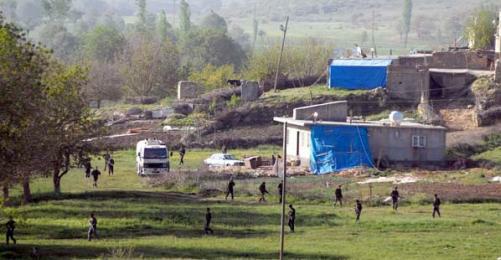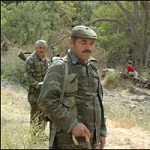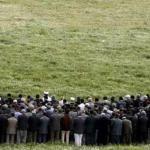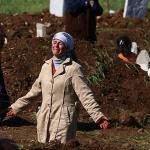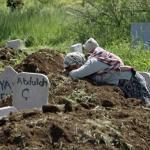The Parliamentary Human Rights Committee has completed its report on the massacre of 44 people in the Bilge village (Kurdish name Zanqirt) of Mardin province, southeastern Turkey.
The committee concluded that the village guard system, used to enrol villagers as armed militia against the PKK, was not solely to blame.
Some of the conclusions of the report were:
Not "honour" killing or blood feud: Children are never killed in blood feuds or "honour" killings. In "honour" killings, women have been killed only if they were directly involved. The fact that there were many women (three pregnant) and children among those murdered, and that the men who were killed were praying, shows that the motivation was different.
Gendarmerie needs to be investigated: Although there is a gendarmerie post very close to the village, gendarmerie officers came to the village very late and the manner of the attack was grasped very late. Later, the event was described as a "terrorist attack", but the person who gave that information was not identified. The equipment recording emergency calls to the Gendarmerie Province Command is siad to have broken a week before the massacre. Members of the committee thus believe that some questions were left unanswered and have called for a judicial and administrative investigation.
Previous events need to be investigated: In 1994, six people died in an attack. This and other events, such as petrol syphoning from close-by pipelines need to be investigated to see if there is any connection to the recent massacre.
Village guard system needs to be restructured: People have used the advantages of their duty in unethic, and sometimes illegal, ways. Village guards need to be trained well, they must not be given special treatment, and they must not be permitted to take part in arbitrary acts.
Families of suspects need protection: The families of the suspected perpetrators need to be taken to a secure location outside of the region, and their lives need to be protected.
Educational mobilisation: While the event needs to be pursued judicially, it must not be forgotten that wrong traditions, customs, beliefs and behaviour can only be changed through education. A start must be made within the families, but all of society must be targeted.
The committee carried out an investigation on 13 and 14 May. It was made up of Mersin MP Zafer Üskül, Bingöl MP Kazım Ataoğlu, Izmir MP Ahmet Ersin, Yozgat MP Mehmet Ekici and Istanbul MP Ayşe Jale Ağırbaş. Later, Afyonkarahisar MP Ahmet Koca, Kahramanmaraş MP Fatih Arıkan and Denizli MP Mithat Ekici joined the committee.
Gendarmerie reacted hours later
The report said that gendarmerie officers acted 2.5 hours after being informed of the murders.
The district gendarmerie command of Mazıdağı said that the commander had been informed at 9.18 pm, that the officers left the station at 10.25 pm, and arrived at the village within 35-40 minutes. Because of the possibility that there was a terrorist attack, an operation involving two prosecutors took place at midnight. Eight people were caught.
The gendarmerie said that the eight people had not run away, but had planned to draw the gendarmerie into the village to attack them, so that the murders could later be blamed on terrorism.
When committee president Üskül asked whether the suspects had resisted, he was told they had not.
The gendarmerie further told the committee that the suspects were caught with guns on their person and near the village. The guns belonged to the state (as they were village guards), and there were two more licensed guns. The suspects were also caught with hand grenades. The suspects' statements were taken not by the gendarmerie but by the prosecution. (TK/AG)





